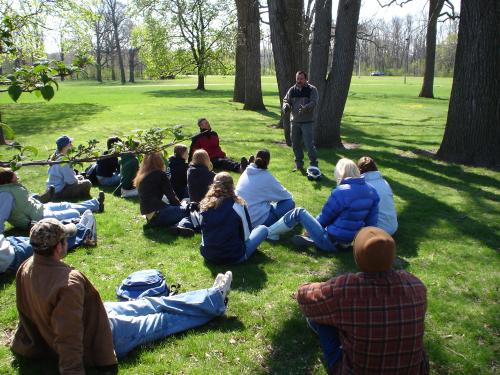About
Welcome and General Information
Welcome to the Department of Horticulture. Michigan has long been an important horticultural state. After the forests were cut in the late 1800s, farmers moved to Michigan and found good land and climates conducive to growing many horticultural crops. Land located along Lake Michigan is particularly suited for apple, peach and cherry orchards because southwesterly winds sweeping across the lake provide protection from sudden temperature changes. Former swamps are now used to produce blueberries, celery, onions, and other horticultural crops. Nurseries, florists and garden centers are numerous, and urban areas provide ready markets for horticultural products.

As a subject, Horticulture has been part of the Michigan State University curriculum since this pioneer land grant institution opened in 1857. In 1883 Horticulture became a separate department headed by Liberty Hyde Bailey, who later became known as the "Dean of American Horticulture." Eustace Hall, the first building to be constructed in the United States solely for the teaching and study of horticulture, was completed in 1888, and it remains as the second oldest academic building on campus. The Department has offered MS degrees since 1910 and PhD degrees since 1927.
The Horticulture Department is known throughout the world for its excellence in teaching and research. In 1986 the MSU Horticulture Department moved into the new Plant and Soil Sciences Building located on the southwest corner of the intersection of Wilson and Bogue Streets. Some of the outstanding features of this facility are computerized greenhouses, excellent research and teaching laboratories, a floral design lab, a retail plant shop, and an autotutorial lab for students.
The Department's mission is to prepare our students for horticulture-related careers in science and business. This includes making new discoveries in the plant sciences; promoting the use of plants and food for improved human health and a safe environment; improving the characteristics, quality and availability of horticultural products; and strengthening the competitive position of the world's horticultural industries. Faculty members possess a diverse array of expertise - both interdisciplinary (e.g., breeding, genomics, development, physiology, metabolism, molecular biology, and sustainable production), and commodity based (e.g., fruits/pomology, vegetables, viticulture, floriculture, nursery crops, postharvest, design and landscapeecology, and marketing) - which they utilize in their research, teaching and outreach programs, at both the national and international levels.
Horticulture at MSU is exceptionally well positioned to grow and respond to the needs of horticultural constituencies throughout the state and beyond. This expectation is based on many advantages: established and developing program and faculty strengths in extension, research, and teaching; exceptional access to facilities and equipment; strong relationships with a wide variety of constituency groups including consumers and the diverse horticulture industries in Michigan; the priorities of MSU; and the continuing financial support of industries and public and private agencies and institutions.
Undergraduate Teaching
With over 110 majors in our B.S. program and nearly 100 students in our Certificate Program through the Institute for Agricultural Technology, we have one of the largest undergraduate horticulture programs in the US. To broaden the educational experiences of our students and to develop their capacity to operate and think globally, we are also involved in a variety of transfer and overseas exchange programs.
A Certificate program administered by the Institute of Agricultural Technology (IAT) is offered in Horticulture in the field of Landscape & Nursery Management. There are many opportunities in the horticulture industry for graduates from the Landscape Horticulture Certificate Program at Michigan State University. Further information on the IAT Horticulture programs may be obtained by contacting Marcus Duck at duckmarc@msu.edu or (517) 355-5191 ext. 1351.
Michigan State University offers a four-year curriculum leading to a Bachelor of Science Degree in Horticulture in preparation for positions of responsibility in horticulture. Practical horticultural experience is recommended either before college or during summers while in college.
Horticulture prepares students to meet the challenges of an expanding multibillion-dollar industry. Horticulture is high technology, encompassing production and management in our traditional businesses (both on the farm and in the most advanced controlled environment facilities), marketing and utilization of intensively cultivated, high-value crops, provision of horticultural services as technicians, consultants, designers, and educators at all levels, and in research in product development, growth regulation, biotechnology, breeding and genetics, and sustainable agriculture.
Industry support for teaching is also excellent, providing laboratory supplies and materials, funding scholarships, internships, recruiting events, and field trips. Indeed, industry sees MSU as one of the best regional and national sources for students well-prepared to address their needs.

Our undergraduate curriculum is continuously reviewed and evaluated for opportunities to introduce new concepts, practices, and technologies, and to ensure that the curriculum is well-integrated with practical and hands-on experiences and internships to help students develop problem solving skills in management, design, science, and technology. Students will have opportunities to enroll in courses On-line, courses which are integrated with outreach/extension programs (on and off campus) and 1 and 2 credit-module courses offered in 5 and 10 week periods. Students are also extensively involved in professional and social activities beyond the classroom, working in research laboratories, assisting in landscape, greenhouse, garden, and nursery operations, running the Student Horticulture Association's very popular annual spring garden show, and participating in academic and field events associated with the National Association of Landscape Professionals and the Mid-American Collegiate Horticultural Society (MACHS).
To facilitate student and faculty interactions and advising, we also encourage and financially support students to engage in research, extension, and teaching projects as team members with faculty. Undergraduates may also enroll for credit in undergraduate research projects. And, although research is a departmental priority, continually increasing in scope and output, one-on-one advising is a major faculty responsibility. In addition, all our classes, undergraduate and graduate, are relatively small and taught by our 26 highly qualified faculty.
Our classrooms, computer access, and laboratory facilities are housed in a state of the art Plant and Soil Sciences Building that was completed in 1988. Other facilities include the award winning Horticultural Demonstration Gardens, the nationally recognized 4-H Children's Gardens, the Lewis Arboretum and the Horticulture Teaching and Research Center (HTRC) on south campus (3 miles distance). An effort is being initiated to establish a new Teaching and Outreach Facility which would provide classrooms and meeting rooms for students and the public related to horticulture. Such a facility would complement the needs of the Student Organic Farm, also located on the HTRC which gives students hands-on experiences in raising horticultural produce. These complement a very attractively landscaped campus that is also a tremendous teaching resource. In addition to 25,500 ft2 of teaching and 120,000 ft2 of research greenhouses, and 180 acres of farm facilities on-campus (HTRC), we have four off-campus farms totaling more than 1,330 acres (in Ionia County and Clinton County and near Traverse City and Benton Harbor) and affiliated facilities like the Kellogg Biological Station in Kalamazoo County.
For more information on our classes, our curriculum, application materials, scholarships and other financial aids, and the campus at MSU, please consult our undergraduate student web page.
Graduate Teaching
Our graduate program is another priority, reflecting our view that a strong graduate program is absolutely critical to achieving excellence. Indeed, this department has been one of the major sources of horticulture faculty throughout the US, and we currently have 59 graduate students working with faculty in MS and PhD research programs and projects that range from the very fundamental and disciplinary to the very applied and clientele-oriented. The majority of our students are supported by extramural grants and our department provides supplemental support to assist in travel and seminars whenever possible. For application materials, please see our graduate program web page.
Research is critically important to graduate study in Horticulture, and all graduate students engage in original research projects with faculty. Graduate students are also expected to take a course of study that enhances their qualifications on graduation and provides a comprehensive background in the chosen area of interest. This includes developing teaching or extension experiences and regularly participating in focused departmental seminars.
Opportunities for research include access to an exceptional combination of state of the art research laboratories and field, greenhouse, and controlled environment facilities. Graduate student research is also enhanced by access to facilities in nearby departments, e.g., laboratories and centers for laser scanning and electron optics, nuclear magnetic resonance, mass spectroscopy, macromolecular structure, and nucleic acid sequencing.
Research
Horticulture faculty members are extensively involved in dynamic research projects that range in focus from very fundamental, disciplinary science investigations to practical issues and stakeholder-oriented problem solving. These studies are supported by nationally-competitive grants from federal and private agencies, grants and contracts from national, regional and state industry groups, as well as programmatic contracts and direct gifts from partner commodity groups. We also receive a base of support for infrastructure needs from AgBioResearch (the Michigan Agricultural Experiment Station), and investment or matching funds from Project GREEEN. In addition to the laboratories and field sites on the MSU campus, the location for our funded research projects range from various sites around Michigan, throughout the mid-west, across the US and around the world (e.g., Africa, Europe, the Middle East and South America). Our faculty are nationally and internationally recognized for their pioneering and impactful research in many areas such as: plant breeding and genetics, molecular biology, floriculture and greenhouse production, sustainable perennial fruit and annual vegetable cropping systems; post-harvest and whole plant physiology; consumer marketing; natural products chemistry and horticulture used in K-12 instruction. For additional information on specific research programs and recent publications, please see our faculty directory.
Extension and Outreach
We strongly believe that a horticulture department must be closely linked to the industry stakeholders and clientele that it serves, and that no fully integrated horticulture department can exist in the absence of support from vibrant, growing horticultural constituencies. Thus, our priorities include continuing and further developing this department's reputation for engagement, accessibility and effective service throughout the state. Consequently, we have numerous Extension and outreach programs aimed at clientele that range from the largest professional growers, packers, shippers, and processors to homeowners and hobbyists. Such programs include: the Masters Gardeners Program, regularly offered short courses in tree fruits, small fruits, viticulture, landscape management, and postharvest physiology, along with numerous on-campus and regional field days, and evening college classes. Horticulture's Extension Specialists and Educators are also significantly involved in developing, coordinating and managing educational programs for commodity organizations like the Michigan State Horticulture Society, the Michigan Vegetable Council, the Michigan Nursery and Landscape Association, Michigan Green Industry Association, and the Michigan Grape and Wine Industry Council, as well as most of the other statewide and many of the regional horticultural commodity groups.
For further information, please feel welcome to contact me:

Dr. William Vance Baird
Professor and Chair
A288 Plant and Soil Sciences
Michigan State University
East Lansing, MI 48824-1325
Phone: (517) 353-0361
Fax: (517) 353-0890
bairdw@anr.msu.edu



 Print
Print Email
Email